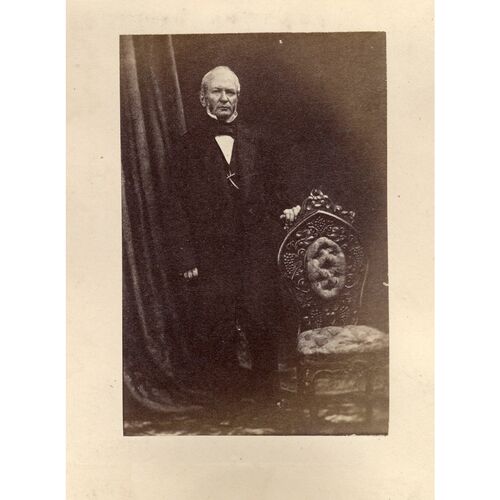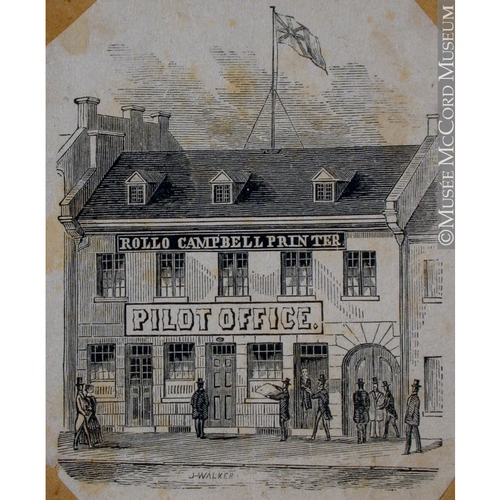CAMPBELL, ROLLO, printer, newspaper publisher, politician; b. 18 Dec. 1803 at Dunning–Mason, Perthshire, Scotland, son of John Campbel (sic) and Nelly Smith; d. 2 Jan. 1871 at Montreal, Que.
In May 1822 Rollo Campbell emigrated to Montreal from Greenock, Scotland, where he had learned his printer’s trade with several small weekly newspapers. In Canada he was employed as a printer by the Montreal Gazette and then by the Morning Courier, a Conservative commercial paper which he printed from its establishment in 1835 until 1836 or 1837. He was first a partner in the firm of John C. Becket, then on his own, and he soon nurtured his printing business into one of Canada’s biggest. He maintained branches in Toronto and Quebec in addition to his Montreal headquarters. Campbell printed the assembly’s Sessional papers from 1842 to 1859, and he often won contracts to print its Journals and the reports for almost every administrative department and agency. He also published the Weekly Register from 1844 to 1847 and the monthly Colonial Protestant during 1848. Besides government documents and newspapers, Campbell printed “Books, Pamphlets, Catalogues, Cards, Cheques, Funeral Cards, Circulars, Auction Bills, Railroad do., Steamboat do., Programmes, Bill Heads, Posters, and Labels.” He guaranteed his workmanship would be “equalled by few, surpassed by none, and on moderate terms.” Campbell’s business soon made him wealthy enough to own valuable real estate and to satisfy certain political ambitions, common enough to contemporary printers.
Campbell participated in Reform politics for years, and in 1844 was printer for Francis Hincks*’ newspaper the Pilot until it got its own print-shop. In the same year Campbell also founded his own paper the Gazetteer, of which nothing is known except that it ceased publication after only a few issues. Campbell re-entered the newspaper business in 1849 when on 20 April, “entirely ruined” by a £500 libel verdict, the Pilot’s proprietors auctioned off their business. Campbell bought it and was officially endorsed by Montreal’s Reform party. He described his political convictions as reform, progress, equality, utility, and the voluntary principle. “Give the people as much liberty as they are able to enjoy and turn to good account,” he urged. “Educate them for self government, and let the power be enlarged as their capacity to use it beneficially increases.” From his Place d’Armes office Campbell published the Pilot on Tuesdays, Thursdays, and Saturdays; the Weekly Pilot and Journal of Commerce, for outlying areas, was printed on Wednesdays. One of Campbell’s editors was the Reverend John Mockett Cramp*, later president of Acadia College. Another was William Bristow*, after 1854 publisher of the Argus. With such editorial assistance, Campbell had time for other political ventures.
In March 1851 he ran for the Montreal city council seat for Saint-Laurent. The main campaign issue was the proposed suburban “Boulevard job.” Campbell and such supporters as Jean-Baptiste-Éric Dorion* believed that after the central city’s citizens were provided with essential services there would “be time enough to talk of Boulevards, in the suburbs, at the city cost.” In the turbulent elections Campbell lost to Tory Joseph Russell Bronsdon, 111 to 124, though most wards elected Reformers. He failed in two bids to unseat incumbent mayor Charles Wilson in 1852 and 1853, but he won the Saint-Laurent council seat in 1852. He held this post until 1856 when he was elected an alderman for Saint-Laurent. The next year he retired from politics. He had worked diligently on the council; he wanted respite from work, and he planned to visit his native land.
In 1857, in Scotland, Campbell gave two talks, later published as Two lectures on Canada, in which he encouraged prospective Scottish emigrants to settle in Canada. Back home, Campbell’s Montreal printing business continued to thrive, but his once informative and provocative Pilot floundered along with the Reform party. Its news was mainly sensational, it contained little political commentary, and it was crowded with advertisements. Campbell’s financial difficulties in the spring of 1862 forced the Pilot to shut down. Afterwards he ventured into other fields. In the 1864–65 city directory he listed his occupation as “city assessor,” and in 1865–66 “Customs House Officer.” He had earlier held the unpaid customs post of deputy master of Montreal Trinity Board. From 1866 to 1867 he was again described as a “printer.” Upon his death in 1871 he was survived by his wife Elizabeth Steel, and a son, Dr Francis Wayland Campbell*.
Rollo Campbell was one of those successful Scottish immigrants absorbed into Montreal’s solid Protestant middle class. His career in business and his son’s entry into a profession were typical. Even his tenure in public office was not unusual since municipal politics attracted many such participants. Campbell’s main distinction was his politically committed Pilot, unfortunately acquired when his party’s work was almost finished, and when new leaders, new problems, and new solutions thrust aside the old.
[Rollo Campbell’s Two lectures on Canada (Toronto, 1857) are interesting since they give an idea of his deep devotion to Canada and of his confidence in her future. The Pilot (Montreal), 1849–62, is the best source of information for Campbell, giving as it does all sorts of information about him, as well as expressing his political convictions. O. B. Bishop, Publications of the government of the Province of Canada, 1841–1867 (Ottawa, 1963) never discusses Campbell, but this book is an excellent one for studying anyone such as Campbell who did so much government printing. e.n.]
General Register Office (Edinburgh), Register of births and baptisms for the parish of Dunning. St Catherine Street Baptist Church (Montreal), Register of births, marriages, and burials, 2 Jan. 1871. Beaulieu et Hamelin, Journaux du Québec. Canadian newspapers on microfilm/Catalogue de journaux canadiens sur microfilm. Montreal directory (Mackay), 1864–73. Wallace, Macmillan dictionary, 110. W. H. Kesterton, A history of journalism in Canada (Carleton Library series, 36, Toronto, 1967).
Cite This Article
Elizabeth Nish, “CAMPBELL, ROLLO,” in Dictionary of Canadian Biography, vol. 10, University of Toronto/Université Laval, 2003–, accessed February 19, 2026, https://www.biographi.ca/en/bio/campbell_rollo_10E.html.
The citation above shows the format for footnotes and endnotes according to the Chicago manual of style (16th edition). Information to be used in other citation formats:
| Permalink: | https://www.biographi.ca/en/bio/campbell_rollo_10E.html |
| Author of Article: | Elizabeth Nish |
| Title of Article: | CAMPBELL, ROLLO |
| Publication Name: | Dictionary of Canadian Biography, vol. 10 |
| Publisher: | University of Toronto/Université Laval |
| Year of publication: | 1972 |
| Year of revision: | 1972 |
| Access Date: | February 19, 2026 |


![[Rollo Campbell] [image fixe] / Studio of Inglis Original title: [Rollo Campbell] [image fixe] / Studio of Inglis](/bioimages/w600.4121.jpg)


